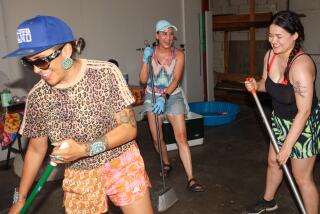‘It keeps the tradition of the Echo Park weirdo jazz artist alive.’
- Share via
Braving the ringing of telephones, the banter of children and the indifference of those few who had come only to study, the Echo Park Chamber Bop Ensemble did a gig Saturday at the Echo Park Branch Library.
The match between music and library, if seemingly off-key, made some sense. Both the library and the jazz trio are struggling to reach a less-than-attentive public.
The library was uprooted from its original home by the 1971 earthquake and has since been relegated to a cramped stucco office building on a one-block dead end between Temple Street and the Hollywood Freeway. Isolation, vandalism, crime and, above all, an oppressively unscholarly milieu have not been good for patronage.
The Friends of the Echo Park Library are trying to pump things up with activities such as book sales and an occasional concert. Their budget is modest. The Friends were able to offer honorariums of $25 each to the three jazz musicians of the Bop Ensemble.
They snapped it up. A gig is a gig, especially if it pays.
“We couldn’t get a job if everybody in town was gone,” the group’s leader, David Angel said, with no apology. He wasn’t just being humble. He was describing, as dispassionately as he could, what the group does with music.
In words, it wasn’t easy.
“It’s not straight ahead,” Angel said. “We see it as kind of free. But it’s not free in that it breaks down the tempo. We break up the beat, but we leave the tempo.”
Each player has the freedom to wander and the responsibility to find his way back, Angel said. It’s a style born of three lifetimes of jazz playing, nurtured in two years of private rehearsals. It is tempered by no motivation toward commercial success. Angel makes his living as a composer and teacher. The drummer, Fred Stofflet, once played with T-Bone Walker, but is a psychotherapist. Bass player Oscar de la Rosa works in employee benefits for the phone company.
Their music is personal.
“It keeps the tradition of the Echo Park weirdo jazz artist alive,” Stofflet said.
“This is out of love, need,” De la Rosa said.
Yet they do have a following.
When the trio went on at 3 p.m. in the reference room, about 30 people sat at wooden library tables and in loose rows of chrome-and-plastic stacking chairs. Gradually, the audience grew to about 50, each new arrival taking a chair off the stack.
Among them were several young couples in weekend dress, a handful of children who occasionally pretended to gaze at their notebooks, a young man in a baseball uniform, a woman in a perky white dress, and a group of middle-aged men who sat slouchily and talked back and forth throughout the performance. They were aficionados. So was the dapper man sitting alone at a table in front. His hair was white, and he wore a brown checkered blazer and orange shirt and brown tie. He looked rigidly ahead, sometimes making faces of recognition, sometimes taking down notes.
The trio had an eclectic stage presence. Angel, whose thinning gray hair was tied into a mini ponytail, wore a blue work shirt. He introduced the songs and played saxophone or clarinet. De la Rosa, wearing suspenders over a black plaid shirt, closed his eyes and hugged the instrument sensually, sometimes rubbing his fingers on the strings to produce subtly wailing sounds. Stofflet, in a black T-shirt, smiled a lot and let out loud groans, possibly when he couldn’t get back with the rest on time.
The music was lyrical, moderate in pace and not so peculiar in sound that it startled.
Several people whose faces showed astonishment when they walked in watched standing for a while, then found chairs and stayed.
At the end of the first set, the musicians were surrounded by admirers, several of them able to discourse competently about music that isn’t straight ahead.
“You get so far away from the beat and then bring it back just in time,” one young man told the drummer.
“I don’t know if it’s right, but if you do it loud enough it sounds right,” Stofflet told him. “It works.”
In the second set, the group played songs by Miles Davis and Thelonious Monk. They sounded different.
“It’s interesting that they have no keyboard player, but they still sound great,” observed a slender man who had a couple days’ growth of beard and spoke in a radio DJ’s voice.
The last song was called “Nuages.”
“We like to get into it the slow way,” Angel said, beginning a soft, sweet saxophone solo.
As “Nuages” faded away like clouds, the woman in white rushed to congratulate the group.
She was jazz vocalist Ruth Price.
The dapper old man headed for De la Rosa and talked to him earnestly for a few minutes. Then he moved on to the drummer.
He was Hugo Davise, teacher of harmony, composition and counterpoint.
“He’s the last of the old school composition teachers,” Angel said.
“He told me everything I did,” De la Rosa said. “He’s critiquing the drummer right now.”
More to Read
The biggest entertainment stories
Get our big stories about Hollywood, film, television, music, arts, culture and more right in your inbox as soon as they publish.
You may occasionally receive promotional content from the Los Angeles Times.











